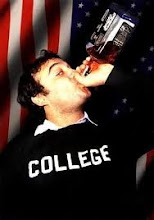
A little known law went into effect on this past New Years Day. that effectively gave an exemption to Indian-Americans so as to allow them to smoke indoors in the course of their tribal rituals.
In other words, while most Native Chicagoans must shiver outside bars and workplaces to grab a quick smoke, so-called, Native Americans can now puff away at leisure indoors, as long as they say they are doing so to commune with the Great Spirit.
This new exemption to the 2008 statewide indoor smoking ban was prompted by one Larry Cooper, a downstate Illinois Chickamuka-Cherokee. As chairman of something called The Standing Bear Council, he lobbied his local State Senator, John Sullivan (D-Rushville) who crafted a bill to exempt the Indians.
This past fall, the measure passed both Houses of the legislature overwhelmingly. Sullivan's bill was vetoed by Governor pro-tem, Pat Quinn, because it was attached to a larger measure, which limited his Gubenatorial powers. The House and Senate handily overrode Quinn's veto. So now the Indians can smoke indoors.
"Tobacco is a sacred herb to Native Americans," Cooper told a downstate newspaper.
I expected to hear howls of protest to the exemption from the Chicago Lung Association and the rest of the clean air crowd. After all, they have banned the paleface from smoking even in such breezy locales as Chicago beaches and Deerfield parks. But so far not a peep.
Is this yet another malicious genocidal machination on the part of the evil European invaders to kill off the Indian peoples thru lung cancer? So far, no word on that possibility either from the ever-vigilant blame-America-firsters, but it could be forthcoming.
Indians on both the North and South American continents have long used tobacco in their tribal rituals. Customarily it is smoked to signify, I am told, a oneness between man and the Great Spirit. The idea is that the smoke that man consumes can then waft up to the Great Spirit himself, who can then enjoy it second-hand.
In North America, tobacco smoking was sometimes something of a fertility ritual, as well, since ceremonial "peace pipes" used by tribes there had a long phallic stem conjoined to a bowl -- you get the picture.
But in South and Central America, Indian tribes, such as the Nicoya of Nicaragua and the Cuna of Colombia, would smoke rolled, cigar-like tobacco in their rites. The latter would pass around cups of intoxicating cooked cocao while smoking.
This sounds to me a lot like what goes on in Chicago bars (or went on -- before the 2008 ban)-- puffing away at cylindrical tobacco products while consuming intoxicating beverages.
So I am announcing the founding of a new sect to worship the Great Spirit in Chicago.
I will be the first Bishop.
Our rituals will begin with the congregation lighting up their cylindical tobacco products so as to commune with the Great Spirit by offering him up our second-hand smoke.
Then, as Bishop, I will go down the ceremonial communion rail (behind which the worshipers are seated on stools) and proffer the faithful, mugs of intoxicating fire-water. I will have ample quantities of this on draft or in bottles.
Then, during the ceremonies, the juke box will play our sacred hymns. For instance, Cherokee People, by Paul Revere and the Raiders. And Now That The Buffalo's Gone, by Buffy Sainte Marie.
And our final hymn to the Great Spirit will be Indian Lake, by the Cowsills.
"At Indian Lake
it is easy to make
the way the Indian do.
CHORUS
(Indian war whooping)"
This will be the exit hymn sung at closing time, which will be promptly at 2 am -- or 5 am, if we pay off the local Alderman to keep our sacred services going longer.
I forgot to mention. There will be an offering of tithes to the Great Spirit and his Bishophric in Chicago, which will be taken up with the proferring of each mug of fire-water.













No comments:
Post a Comment
Comments invited, however anonymous commentors had better deal directly with the issues raised and avoid ad hominem drivel. As for Teachers' Union seminar writers -- forget about it.